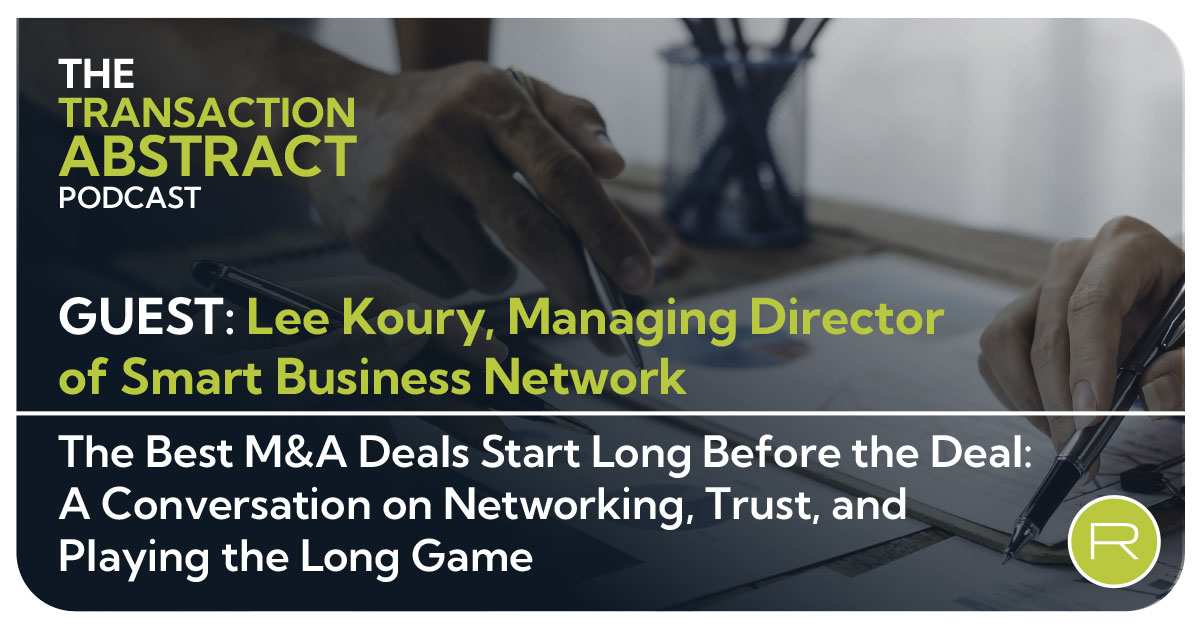When it is time to sell your company, you have to prepare on two fronts. A business owner has to prepare themselves personally for this major change while they also consider their company’s readiness for sale. In a recent episode of The Transaction Abstract podcast, Joe Hellman discussed owner readiness with business exit strategist advisor Julie Keyes. Keyes is an experienced business consultant as well as a Certified Exit Planning Advisor (CEPA), and author of the book, “Poised for Exit.”
In this follow-up episode, Joe and Julie discuss the business readiness process in M&A transactions and how that differs from owner readiness (the topic of the first episode).
What Is Business Readiness?
You want to get the best possible deal when you sell your company, but you also need to make sure the business is actually transferable. If it is too dependent on the owner, cash is not flowing, the leadership is not in place, sales are flat—issues like these can detract value from the business and make its transfer more challenging. That can be especially problematic when the marketplace is volatile, as it has been in the past year or two.
“Vanilla does not sell,” Keyes warns, especially if you plan to sell to a third party (as opposed to family or staff members). Instead, to be transferable a business must offer a value proposition that is different, exceptional, best in class. So you can think of business readiness as a process of de-risking—identifying and removing potential barriers to transferability.
Would You Buy Your Company?
If the answer is no, ask yourself why. Your goal is to get ahead of any red flags a buyer might have. Depending on the transaction, you may not have time to fix everything, but you can at least address some.
For example, Keyes says the vast majority of her clients do not have a current, working strategic plan. This tells a buyer you aren’t very serious about making your business successful and profitable. You can fix this with some simple but effective steps:
- Ask yourself, if you were sticking around, where would you take the business?
- Do a good, old-fashioned SWOT analysis with your leadership team
- Put together a solid plan for growth and improvement
Let Go of Total Control
A business that cannot function without you is less desirable to a buyer. Owners are notoriously hesitant to relinquish control, but delegation—especially to a great leadership team—prepares your company for post-sale success. Buyers appreciate that.
“Listen to the smart people around you,” cautions Keyes. “No advisor has all the answers. No business owner ever has all the answers. But surrounding yourself with people who could have answers that you don’t have is the best foot forward toward dialing in the business end so it is both attractive and prepared for transition.”
Grow Your Business to Increase Value
You can boost revenue in the near term without spending a lot of money through horizontal, vertical, geographic, or other growth opportunities. Keyes likes horizontal and vertical options best.
“Horizontal growth is when you have a good solid database of clients or customers and you have other services and products that you could sell to them,” says Keyes. “So they're already on your warm list, you're already working with them. But there's a lot of opportunity to grow with the people who are already doing business with you.”
About the vertical approach, Keyes says a company should look at “Do you have capacity with your current staff, with your equipment, with your space. You have capacity to take on more business without adding on additional expense.”
Revisit Marketing and Sales
Keyes often sees companies with what she describes as “broken” marketing and sales. There is no strategy, or there is no marketing at all. The company is not working with a marketing firm. They might have a website, but there is no strategy for that, either. If the website is generating leads, they are not good ones. Salespeople are complaining.
However, sales and marketing are the two things that actually drive revenue in a company. Everything else is an expense. So if your sales and marketing are not working, you are strictly an operations company. But what buyer cares if your operations run smoothly if you are the best-kept secret in town? Especially if you have been the one driving sales. You have to have the right people. You have to have the right strategy.
Final Thoughts
Owners should consider stopping having the business pay for personal expenses like cars, cell phones, or season tickets. This is often an issue in smaller companies and it will help clean up a company’s financials.
Keyes also says look at your “owner dependency” and “Do a time study on yourself if you're really not sure what it is that you need to delegate.” She recommends tracking everything you do in 15-minute chunks over at least two weeks.
“It's just for you to look at and go, ‘Wow, I’ve got to get rid of some of these things’....If you're a smaller company and you're one of the main people that drive revenue in the business, we need to have someone else helping you with driving revenue. You can't be the face of the business or you won't be able to sell it.”
Keyes stresses that business owners should take a look at their company from a buyer’s perspective instead of their own. “We’re all afraid someone is going to call our baby ugly,” she laughs. And it might be. Look at it from a logical perspective versus an emotional perspective, she advises, and be honest with yourself, so you can have the best possible exit outcome.

 Redpath and Company
Redpath and Company
![Tips to Boost Your Company’s Attractiveness to Buyers [PODCAST]](https://www.redpathcpas.com/hubfs/Podcast/Julie-Keyes-Podcast-2.jpg)



